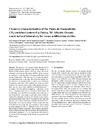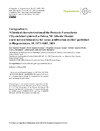Identificador persistente para citar o vincular este elemento:
https://accedacris.ulpgc.es/jspui/handle/10553/106007
| Título: | Chemical characterization of the Punta de Fuencaliente CO2-enriched system (La Palma, NE Atlantic Ocean): A new natural laboratory for ocean acidification studies | Autores/as: | González Delgado, Sara González Santana, David Santana-Casiano, Magdalena González-Dávila, Melchor Hernández, Celso A. Sangil, Carlos Hernández, José Carlos |
Clasificación UNESCO: | 251002 Oceanografía química | Fecha de publicación: | 2021 | Proyectos: | Efecto de la Acidificacion Oceanica, la Temperatura y El Contenido de Materia Organica en la Persistencia de Fe(Ii) en El Oceano Atlantico ADAPTIVE (PGC2018-100735-B-I00) |
Publicación seriada: | Biogeosciences | Resumen: | We present a new natural carbon dioxide (CO2) system located off the southern coast of the island of La Palma (Canary Islands, Spain). Like CO2seeps, these CO2submarine groundwater discharges (SGDs) can be used as an analogue to study the effects of ocean acidification (OA) on the marine realm. With this aim, we present the chemical characterization of the area, describing the carbon system dynamics, by measuring pH, AT and CT and calculating ω aragonite and calcite. Our explorations of the area have found several emission points with similar chemical features. Here, the CT varies from 2120.10 to 10 784.84 μ mol kg-1, AT from 2415.20 to 10 817.12 μmol kg-1, pH from 7.12 to 8.07, ω aragonite from 0.71 to 4.15 and ω calcite from 1.09 to 6.49 units. Also, the CO2emission flux varies between 2.8 and 28 kg CO2d-1, becoming a significant source of carbon. These CO2emissions, which are of volcanic origin, acidify the brackish groundwater that is discharged to the coast and alter the local seawater chemistry. Although this kind of acidified system is not a perfect image of future oceans, this area of La Palma is an exceptional spot to perform studies aimed at understanding the effect of different levels of OA on the functioning of marine ecosystems. These studies can then be used to comprehend how life has persisted through past eras, with higher atmospheric CO2, or to predict the consequences of present fossil fuel usage on the marine ecosystem of the future oceans. | URI: | https://accedacris.ulpgc.es/handle/10553/106007 | ISSN: | 1726-4170 | DOI: | 10.5194/bg-18-1673-2021 | Fuente: | Biogeosciences [ISSN 1726-4170], v. 18 (5), p. 1673-1687, (Marzo 2021) |
| Colección: | Artículos |
Citas SCOPUSTM
11
actualizado el 08-jun-2025
Citas de WEB OF SCIENCETM
Citations
8
actualizado el 08-jun-2025
Visitas
159
actualizado el 12-jul-2025
Descargas
81
actualizado el 12-jul-2025
Google ScholarTM
Verifica
Altmetric
Comparte
Exporta metadatos
Los elementos en ULPGC accedaCRIS están protegidos por derechos de autor con todos los derechos reservados, a menos que se indique lo contrario.

